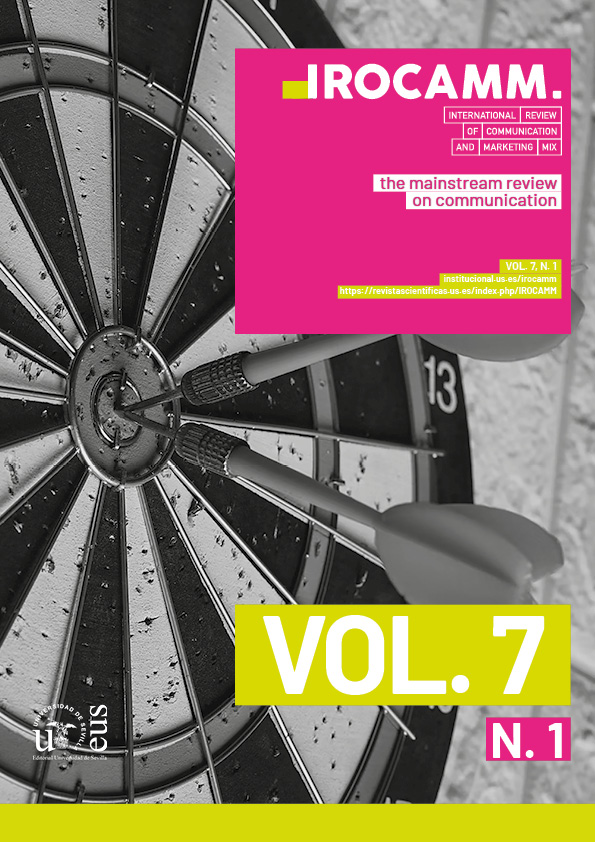Percepciones sobre discursos de género y empoderamiento en la publicidad peruana: un estudio con jóvenes universitarias
DOI:
https://doi.org/10.12795/IROCAMM.2024.v07.i01.01Palavras-chave:
Femvertising, empoderamiento femenino, publicidad, percepción femenina, saturación publicitaria, marketing inclusivoResumo
Este estudo explora a perceção das jovens universitárias peruanas sobre o gender washing na publicidade. Através de uma análise qualitativa baseada em entrevistas aprofundadas, examina-se se este fenómeno é percebido como um autêntico compromisso para o empoderamento feminino ou se é considerado uma estratégia comercial oportunista. O estudo revela uma postura crítica face às práticas de gender washing, identificando fatores que influenciam a perceção de autenticidade e oportunismo na publicidade. Os resultados sugerem uma exigência de representações mais genuínas e responsáveis do género feminino na publicidade. Este trabalho contribui para o entendimento de como as consumidoras jovens interpretam e reagem ao uso do género na publicidade, oferecendo perspetivas valiosas para as marcas no mercado peruano.
Downloads
Referências
Abitbol, A., & Sternadori, M. (2019). Championing women’s empowerment as a catalyst for purchase intentions: Testing the mediating roles of OPRs and brand loyalty in the context of femvertising. International Journal of Strategic Communication, 13(1), 22–41. https://doi.org/10.1080/1553118X.2018.1552963
Åkestam, N., Rosengren, S., & Dahlen, M. (2017). Advertising “like a girl”: Toward a better understanding of “femvertising” and its effects. Psychology and Marketing, 34(8), 795–806. https://doi.org/10.1002/mar.21023
Aksakal, M., & Schmidt, K. (2015). German country report on semi-structured interviews with temporary migrants: Asian-German transnational spaces-report for the EURA-NET project. https://pub.uni-bielefeld.de/record/2901514
Arellano Marketing. (2017). Estilos de vida: Las Modernas. https://www.arellano.pe/los-seis-estilos-de-vida/las-modernas/
BBC News Mundo. (2019, Marzo 5). Google: lo que revela el polémico análisis de igualdad salarial del gigante tecnológico entre hombres y mujeres. BBC News Mundo. https://www.bbc.com/mundo/noticias-47458780
Baxter, A. (2015). Faux Activism in Recent Female-Empowering Advertising. The Elon. Journal of Undergraduate Research in Communications, 6(1), 48–58. http://www.inquiriesjournal.com/a?id=1133
Becker-Olsen, K., Cudmore, B., & Hill, R. (2006). The impact of perceived corporate social responsibility on consumer behavior. Journal of Business Research, 59(1), 46–53. https://doi.org/10.1016/j.jbusres.2005.01.001
Becker-Herby, E. (2016). The Rise of Femvertising: Authentically Reaching Female Consumers [Master’s thesis, University of Minnesota]. https://hdl.handle.net/11299/181494
Belknap, P., & Leonard, W. M. (1991). A conceptual replication and extension of Erving Goffman’s study of gender advertisements. Sex Roles, 25(3-4), 103–118. https://doi.org/10.1007/BF00289848
Berger, J. (2023). Modos de ver. Fósforo.
Biernacki, P., & Waldorf, D. (1981). Snowball Sampling: Problems and Techniques of Chain Referral Sampling. Sociological Methods & Research, 10(2), 141–163. https://doi.org/10.1177/004912418101000205
Collins Jr, G. E., Wilson, E., Luo, M., & Surmeier, A. (2016). BIC Pens For Her. https://digitalcommons.murraystate.edu/scholarsweek/Fall2016/MME/2/
Creswell, J. (2003). 179 research Design: Qualitative. Quantitative and Mixed Methods. https://www.ucg.ac.me/skladiste/blog_609332/objava_105202/fajlovi/Creswell.pdf
Cwynar-Horta, J. (2016). The commodification of the body positive movement on Instagram. Stream: Culture/Politics/Technology, 8(2), 36–56.
Czerniawski, A. M. (2022). “Real” bodies in plus-size fashion. Fat Studies, 11(3), 231–243. https://doi.org/10.1080/21604851.2021.1913827
Fox-Kirk, W., Gardiner, R. A., Finn, H., & Chisholm, J. (2020). Genderwashing: The myth of equality. Human Resource Development International, 23(5), 586–597. https://doi.org/10.1080/13678868.2020.1801065
García-Jiménez, J. V., Ruiz-de-Maya, S., & López-López, I. (2017). The impact of congruence between the CSR activity and the company’s core business on consumer response to CSR. Spanish Journal of Marketing-ESIC, 21(s1), 26–38. https://doi.org/10.1016/j.sjme.2017.01.001
Garrido, R. (2020). El ‘body positive’ e Instagram, ¿Es compatible promover el amor propio en la red social del culto al cuerpo? 20 minutos. https://www.20minutos.es/noticia/4344411/0/el-body-positive-e-instagram-es-compatible-promover-el-amor-propio-en-la-red-social-del-culto-al-cuerpo/
Gerard, K. (2019). Rationalizing “gender-wash”: Empowerment, efficiency and knowledge construction. Review of International Political Economy, 26(s5), 1022–1042. https://doi.org/10.1080/09692290.2019.1625423
Illouz, E. (2020). El fin del amor: una sociología de las relaciones negativas (Vol. 3104). Katz Editores.
Inglehart, R. (1997). Modernization and postmodernization: Cultural, economic, and political change in 43 societies. Princeton University Press. https://doi.org/10.2307/j.ctv10vm2ns
Jiménez-Marín, G., Simancas-González, E., & González-Oñate, C. (2022). La publicidad: Estructura de la industria en España. Del cliente a la agencia (y viceversa). Pirámide.
Kent, M. (2015). The power of storytelling in public relations: Introducing the 20 master plots. Public Relations Review, 41(4), 480–489. https://doi.org/10.1016/j.pubrev.2015.05.011
Mamuric, N. (2019). Femvertising: Advertising taking social responsibility to sell brands. Journal of Brand Strategy, 7(4), 318–325.
Menéndez, M. I. (2020). «You’re made of what you do»: Impulso del deporte femenino a través de estrategias de femvertising en Nike. Retos: nuevas tendencias en educación física, deporte y recreación, 38, 425–432. https://doi.org/10.47197/retos.v38i38.76959
Mensa, M., & Grow, J. M. (2023). Women are survivors: Public services announcements on violence against women in Latin America. Violence Against Women, 29(6-7), 1252–1274. https://doi.org/10.1177/10778012221104509
Palomo-Domínguez, I., Jiménez-Marín, G., & Valenzuela, N. S. G. (2023). Social Media Strategies for Gender Artivism: A Generation of Feminist Spanish Women Illustrator Influencers. Information & Media, 98, 23–52. https://doi.org/10.15388/Im.2023.98.61
Saldaña, J. (2011). Fundamentals of qualitative research. Oxford University Press.
Sánchez-Riaño, V., Arango Lozano, C. A., & Sojo-Gómez, J. R. (2022). Centennials: La búsqueda del ser en un universo digital. IROCAMM -. International Review Of Communication And Marketing Mix, 5(1), 9–20. https://doi.org/10.12795/IROCAMM.2021.v05.i01.01
Saucedo Espinosa, F., & Sánchez Garza, J. A. (2021). Periodismo digital: Reconfigurando los modelos de negocio y representando un nicho de mercado para emprendedores. IROCAMM -. International Review Of Communication And Marketing Mix, 2(4), 81–92. https://doi.org/10.12795/IROCAMM.2021.v02.i04.07
Simancas González, E. (2019). La formación feminista como arma para combatir la publicidad sexista. Hachetetepé. Revista científica de educación y comunicación, (18), 47–59. https://doi.org/10.25267/Hachetetepe.2019.v1.i18.6
Sterbenk, Y., Champlin, S., Windels, K., & Shelton, S. (2022). Is Femvertising the New Greenwashing? Examining Corporate Commitment to Gender Equality. Journal of Business Ethics, 177, 491–505. https://doi.org/10.1007/s10551-021-04755-x
Vandellos, E., Villarroya, A., & Boté-Vericad, J.-J. (2023). ¿Qué sabemos de la femvertising? Una revisión sistemática de la literatura. Cuadernos.Info, (56), 185–205. https://doi.org/10.7764/cdi.56.61527
Varghese, N., & Kumar, N. (2020). Feminism in advertising: Irony or revolution? A critical review of femvertising. Feminist Media Studies, 22(2), 1–19.
Walters, R. (2021). Varieties of gender wash: Towards a framework for critiquing corporate social responsibility in feminist IPE. Review of International Political Economy, 29(5), 1–24.
Windels, K., Champlin, S., Shelton, S., Sterbenk, Y., & Poteet, M. (2019). Selling Feminism: How Female Empowerment Campaigns Employ Postfeminist Discourses. Journal of Advertising, 49(1), 1–16.
Downloads
Publicado
Como Citar
Edição
Secção
Licença
Direitos de Autor (c) 2023 IROCAMM - International Review Of Communication And Marketing Mix

Este trabalho encontra-se publicado com a Licença Internacional Creative Commons Atribuição-NãoComercial-CompartilhaIgual 4.0.
International Review Of Communication And Marketing Mix proporciona un acceso sin restricciones a su contenido desde el momento de su publicación en esta edición electrónica, y por lo tanto es una revista de acceso abierto. Los originales publicados en esta revista son propiedad de la Universidad de Sevilla y es obligatorio citar su origen en cualquier reproducción total o parcial. Todos los contenidos se distribuyen bajo una licencia Creative Commons - No comercial - Attribution Share Alike 4.0 (CC BY-NC-SA 4.0). Esto debe indicarse expresamente de esta manera cuando sea necesario. Puede consultar la versión informativa y el texto legal de la licencia.
Los autores que publican en esta revista están de acuerdo con los siguientes términos:
- La cesión de derechos se hace bajo la licencia Creative Commons.
- Los autores pueden hacer por separado arreglos adicionales para la distribución no exclusiva de la versión de la obra publicada en la revista (por ejemplo, colocándola en un depósito institucional o publicándola en un libro), con un reconocimiento de su publicación inicial en esta revista.
- Se permite y alienta a los autores a difundir su trabajo electrónicamente (por ejemplo, en repositorios institucionales o en su propio sitio web) antes y durante el proceso de presentación, ya que ello puede dar lugar a intercambios productivos, así como a una citación más temprana y amplia de los trabajos publicados.
- La difusión de los artículos se llevará a cabo en las redes sociales generales, ResearchGate, Mendeley, Academia.edu, Cosis, e-lis y otras bases de datos o repositorios de textos completos en Internet con los que la revista establece un acuerdo para su difusión y visibilidad.
- El derecho de autor es de dos tipos: los derechos morales y los derechos patrimoniales. Los derechos morales son prerrogativas perpetuas, irrenunciables, intransferibles, inalienables, inembargables e imprescriptibles. Los derechos patrimoniales se refieren a los beneficios obtenidos por el uso o la divulgación de las obras. La IROCAMM - Revista Internacional de Comunicación y Marketing Mix está autorizada exclusivamente a realizar o autorizar por cualquier medio la utilización, distribución, difusión, reproducción, adaptación, traducción o transformación de la obra...
International Review Of Communication And Marketing Mix does no cobra honorarios por la presentación de trabajos, ni tampoco por la publicación de sus artículos.
























